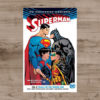If you asked me my favorite holiday, I would probably say Christmas or Easter, but I wouldn’t want to risk saying that while hooked up to a lie detector. The polygraph would probably jump around erratically until I blushingly admitted the truth: it’s always been Halloween.
I’m reluctant to admit that, because some of you will think poorly of me. I know I’m supposed to hate Halloween. Because I’m an evangelical Christian, of the more conservative sort, some of you will expect me to dismiss All Saints’ Eve as “the devil’s holiday.” Many would expect to see me manning the bobbing-for-Bibles booth at a church Fall Festival or helping blindfolded children at the Reformation Day gathering play “Pin the Theses on the Castle Door.” Some would think that Halloween night would mean my family turning off all the lights and pretending not to be home, while the costumed children of our neighborhood find gospel tracts on our doorstep where a Jack O’Lantern should be. I’m supposed to hate Halloween, but I just can’t do it. Since I was a very small child, Halloween brought to me, well, tidings of comfort and joy.
Halloween, it seemed, took seriously what I intuitively knew to be true: the world outside was terrifying.
As a child, I took seriously what the old people said about the holiday as a “devil’s night,” about the veil between the spirit world and ours being especially, and dangerously, thin that night. That was what I liked about it. Halloween, it seemed, took seriously what I intuitively knew to be true: the world outside was terrifying.
The night also seemed to reinforce what I read in my Bible, that the universe around me was alive with invisible forces, some of which meant me harm. Halloween seemed to be the night when grown-ups would admit this, at least a little bit. It seemed to my younger self, too, that if there were scary realities out there, the idea of calendaring out a night to recognize them for what they were made sense.
The best part of the night for me had nothing to do with candy or costumes, but was rather when the night was over, when I was tucked away in bed, knowing that my parents were asleep on the other side of that sheetrock wall. The night outside might be howling with witches and werewolves, but all was safe at home. That seemed far from pagan to me. It seemed, as a matter of fact, right in line with my biblical ancestors in ancient Egypt. The angels of death could lurk around outside the house all they wished, but the blood was on the doorpost, and all would be well.
However, just as the blood stopped the death and terror on the other side of the doorposts, we don’t just live in a world ruled by Halloween. On this side of the cross and resurrection, the blood of Christ covers us. If we only lived in a Halloween world, then that would be reason for fear and lament. However, this present reality is tempered and shaped by the truth of Good Friday and Easter.
The monsters are out there, and in here, but they will not win.
Halloween may be a time when the barrier between the spiritual and earthly are thin. However, Christians know that there is one who has crossed that plane from the glories of heaven to the earthly reality of a stable in Bethlehem. For this reason, we do not shrink away from the evil around us, but instead face it with the assurance that there is a warrior king who has already conquered sin and death on our behalf.
If you stop by my house come Halloween, you might see me walking around our neighborhood, with my sons in their costumes. I can predict that, just like every year, the neighbors down the street will have homemade chili and root beer on their porch, with enough for everyone. I can also predict that my youngest son will tense up and grab my hand when we pass this one particularly creepy house around the corner, the one with the lit-up skeleton on the porch. He will be scared, and I will too. I’ll be scared of a different sort of skeleton, my own, of what will happen after all my life of perpetual motion is over. Will my wife know that I loved her? Will my children see something in the way that I fathered them to point them to the Father God who always loves, who never leaves, who comes with both authority and mercy, both truth and grace? My son will be afraid the skeleton on the porch will eat him. I’m afraid that the skeleton in my future casket won’t measure up to the image I project right now, even on this very page. And that my family will know it.
But on that autumn night, I will take him in my arms, again, and I will say, “Don’t worry. I’m not going anywhere. And I’ll protect you from that skeleton. It can’t hurt you.” In that moment, I will remember what I, as a child, loved most about Halloween. The fear will be there, not hidden away, not rationalized out of existence, not avoided in polite conversation. But behind the fear will be the kind of safety that comes only with a strong protector. The monsters are out there, and in here, but they will not win.
This post was adapted from my latest book, The Storm-Tossed Family.








